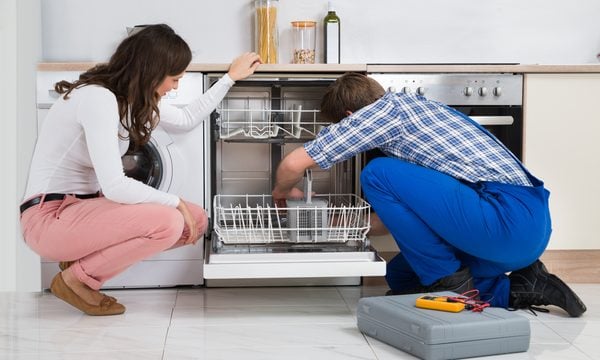Are Home Warranties Worth It in 2026?
Several factors determine if a home warranty is worth the cost, time and potential hassles. Here’s what to consider.

Some or all of the mortgage lenders featured on our site are advertising partners of NerdWallet, but this does not influence our evaluations, lender star ratings or the order in which lenders are listed on the page. Our opinions are our own. Here is a list of our partners.
No matter how well you take care of your home, sooner or later, an appliance or major system is bound to bite the dust. But just 32% of homeowners have money saved specifically for home repairs or maintenance, according to a 2025 NerdWallet survey conducted by The Harris Poll. If you’re in the 68% that doesn’t have money set aside for future appliance or systems repairs, one option to consider is a home warranty.
A home warranty covers appliance and system repairs related to wear and tear from everyday use. It can be a more affordable option if you can’t save for major repairs. But home warranties’ exclusions and limitations make them a poor choice if your appliances and systems are still under manufacturer warranty or you can put away money to cover future repairs.
When is a home warranty worth it?
| Consider a home warranty if you... | Consider an alternative if you... |
|---|---|
|
|
Consider a home warranty if you...
✅ Can't save money to pay for future repairs.
✅ Have appliances or systems eligible for home warranty coverage.
✅ Are not worried about items being repaired quickly.
✅ Are comfortable letting a company choose the repair technicians.
Consider an alternative if you...
❌ Can save money in a repair fund.
❌ Don't think a home warranty will cover the types of repairs your items will need.
❌ Have older appliances and systems and don't have any maintenance records for them.
❌ Will need items repaired quickly.
❌ Want to choose your own repair company every time.
Not all homeowners will find a home warranty to be worth the cost, but some will save money in the long run. A home warranty might be worth considering if you fit in any of these categories.
Your appliances or systems are starting to wear out from everyday use. A home warranty plan could help you save money on certain repairs, but it won’t cover all repairs. Examples of things home warranty companies tend to exclude are issues caused by improper maintenance or natural disasters, and parts such as chains on garage door openers.
You're comfortable letting a company choose the repair technicians. Most home warranty companies prefer to use technicians that are in their networks instead of letting you choose the repair company. If that’s not a problem and you just want someone else to handle the scheduling, a home warranty might be a good fit.
You’re comfortable potentially waiting longer for a repair. Because most home warranty companies use their preferred technicians, you might have to wait longer for appointments than if you’d hired a repair company on your own. Be honest with yourself about how long you’re willing to wait for a repair; your opinion might change if you’re without air conditioning for a week in August.
You can’t save enough money to pay for repairs out of pocket. If you can’t put money away for repairs but you can afford the monthly fee for a home warranty, a home warranty might be worth getting. Keep in mind that you’ll also have to pay service fees and aren’t guaranteed a home warranty will cover a repair.
When to skip a home warranty
There are some situations when it might be best to skip a home warranty.
Your appliances or systems are under manufacturer warranty. Most home warranties don’t pay for repairs if an appliance or system is covered through a manufacturer warranty. If some of your items have manufacturer warranties and you still want a home warranty for other items, look for a plan that is either customizable or repairs only systems or only appliances. This way you won’t pay for coverage you can’t use.
You have a brand-new house. Many new builds come with warranties. A builder’s home warranty is meant for structural issues — something like the roof collapsing — which is different from the type of home warranty we’re talking about in this article. But look at any appliance or system warranties that came with the purchase of your home to see what's covered before buying a separate home warranty plan.
Your appliances or systems are at least 10 years old. Many home warranties pay less to repair or replace older items through a process known as depreciation. Depending on the age of your appliance or system, the amount a home warranty company will pay to fix it might be much less than the actual cost of the repair. In this case, you’ll likely have to pay a large part of the repair bill on your own.
Your appliances are considered professional grade. Most home warranty companies won’t repair professional grade appliances, even if they’re only for personal use. Some companies will cover professional grade appliances if you purchase extra coverage, which usually comes with an additional fee each month. Double-check whether your appliances are covered before agreeing to buy a home warranty.
You use your home appliances or systems for commercial purposes. It’s rare for a home warranty plan to cover any appliance or system in a commercial location, including when you use your home for your business. There might be some exceptions, but you’ll want to read your service agreement carefully to ensure using your home for business won’t negate coverage.
Things to consider when looking into a home warranty plan
Can you afford a home warranty?
The cost of a home warranty varies by company, plan and your location. The average home warranty plan costs about $62.33 in 2025, according to NerdWallet's analysis. That’s over $700 a year in monthly fees.
You might be able to get a plan for as low as $30 a month, but it won’t cover as much as more expensive plans. Getting a plan that covers a lot of appliances and home systems with higher coverage limits could cost you upwards of $100 per month.
On top of your monthly fee, you’ll also pay a service fee every time a technician responds to a claim. Service fees usually range from $65 to $150 per call. That means if you agree to pay $100 per service call and you file three claims within a year, you’d be looking at an extra $300 out of pocket. And you’ll pay a service fee even if a home warranty company denies your claim and refuses to pay for a repair.
You’ll also be responsible for any repair costs over your service contract’s coverage limit. For example, if your plan pays up to $3,000 for HVAC repairs and an approved repair costs $3,500, you have to pay that leftover $500.
When asking yourself if you can afford a home warranty, also ask yourself if you can afford a repair if your home warranty company denies your claim outright.
Can you wait for a repair?
When you file a claim with a home warranty company, there’s no guarantee a technician will be available to come to your house right away.
Some home warranty providers state in their service agreements that they’ll talk with a technician within a certain timeframe to schedule an appointment. But a technician might not be available to look at your appliance or system for a few days or a few weeks. And you might have to wait longer for them to return to repair it if they need to order parts or the home warranty company wants a second opinion.
Are you comfortable working with two companies?
With a home warranty, you’re working with the warranty company and the repair company. A home warranty can simplify some aspects of covered repairs, but some customers have found working with home warranty companies to be more of a hassle than a benefit.
Issues that homeowners can run into while trying to get a claim processed include:
- Technicians not showing up for appointments.
- Having to find their own repair companies because a home warranty provider didn’t have a contracted company in the homeowner’s area.
- Waiting for reimbursement when approved to hire their own repair technicians.
- Technicians are ready but waiting for the home warranty company’s final approval.
Not all customers have experienced these scenarios, but any combination can make the repair process more stressful than you expect.
Advertisement
Tips for finding a home warranty
1. Know what coverage you're paying for
Home warranties differ in a lot of ways, so you’ll want to ensure you understand several aspects of your coverage.
Know what items are covered. Plans that combine coverage for appliances and systems, known as comprehensive plans, differ on how many items they cover. Some cover just a few appliances and systems, and others cover most kitchen appliances and all major home systems.
Some people may expect major items like the central air conditioning unit, refrigerator, and washer and dryer to be covered under a basic plan. But some companies might require extra coverage or a more expensive plan for these units.
Know what situations aren’t covered. Before signing up for a plan, ask to see the service agreement and look for exclusions or limits of liability to find what parts or situations your plan doesn’t cover. You’re unlikely to find them listed on a home warranty company’s website.
Know how much your plan will pay for each repair. Home warranties tend to limit how much a plan will pay toward a repair.
For example, home warranty limits tend to range from $2,000 to $6,500 for heating and air conditioning repairs. Depending on where you live, the cost of a new furnace can average between $2,300 to over $8,000.
Knowing your home warranty’s coverage limits and the average cost of certain repairs or replacements can help you calculate if a plan has sufficient coverage for your home.
Know how much your home warranty will pay overall. Additionally, some home warranties have an aggregate limit, which is the most a company will pay during a service agreement (usually 12 months). This means once you hit that maximum limit, the home warranty won’t pay for any more repairs, even if they would have been covered otherwise.
Pay close attention to a company’s aggregate limit, which might be less than you expect.
» MORE: What does a home warranty cover?
2. Research the company's history to get a fuller picture
You might start your home warranty research on company websites and best-of lists, but these won't tell the whole story of what it's like to use your coverage. You can get a clearer idea of a company's reputation by checking out sources like government websites and reading about customers' experiences.
Consumer reviews, the website for your state's attorney general, and sites like the Better Business Bureau can be helpful resources for learning about a home warranty company's history and finding ones with positive customer reputations and track records.
3. Find out when your coverage begins
It's common for home warranty companies to start coverage 30 days after the purchase of the contract. Though this will be spelled out in the agreement, it's a detail that homeowners can easily overlook. If something breaks down or malfunctions during those 30 days, the home warranty company might deny a claim to repair it. In this case, you may have to cover your own repairs on those items.
What to know before buying a home warranty
Reading the coverage and exclusions information in your contract is one of the most impactful things you can do to avoid costly misunderstandings in the future. You have a right to read your contract before purchasing a plan, and it’s important to understand that home warranties:
- Always have exclusions to coverage, no matter what their sales pitches say. Read your contract carefully before purchasing a plan — especially anything listed as an exclusion or limit of liability. For example, a company might cover air conditioning systems but exclude certain parts or components, such as coils. Other companies cover plumbing repairs but won’t pay to clear all plumbing stoppages or repair certain types of leaks.
- Are not a type of insurance. Even though some companies call their service fees deductibles, home warranties do not work the same way as insurance policies. They differ in what they cover and how they pay for repairs or replacements. A home warranty is not a supplement for homeowners insurance.
- Limit how much they pay. If the cost of a repair or replacement goes beyond a limit stated in your contract, you’ll have to pay the difference. For example, if the bill for a repair is $2,000 and the limit is $1,500, you’re required to cover $500. This is in addition to your monthly premium and service fee.
- Can deny your claim for several reasons. Examples include if you had work performed on a covered item without approval or you modified the system or appliance.
- May not pay enough to cover the full cost of replacing a covered item. Home warranties often depreciate the value of items as they age, so you’ll likely have to pay at least some money to replace an item, even if it’s covered by the contract.
Alternatives to home warranties
If you'd rather avoid navigating a home warranty, you could take the cash you would put toward purchasing a home warranty and stash it in an emergency fund instead. And keeping those funds in a high-yield savings account could bring in a little extra cash while you’re waiting for an appliance or system to fail.
You can also explore adding "endorsements" to your homeowners insurance policy. These can expand your coverage to pay for electrical or mechanical damage to appliances, systems and utility lines. But they likely won't cover damage from normal wear and tear.
If you live in an area where natural disasters are common, you can also look into flood and windstorm insurance policies. Home warranties rarely pay for damage caused by natural disasters, so specific insurance policies that go beyond your homeowners insurance could help if your home is damaged by high water or strong winds.
Article sources
NerdWallet writers are subject matter authorities who use primary,
trustworthy sources to inform their work, including peer-reviewed
studies, government websites, academic research and interviews with
industry experts. All content is fact-checked for accuracy, timeliness
and relevance. You can learn more about NerdWallet's high
standards for journalism by reading our
editorial guidelines.
More like this
Related articles
AD
50% OFF Select Plans — Limited Time Only
Call American Home Shield
REDEEM NOW
on American Home Shield's website
AD
50% OFF Select Plans — Limited Time Only
- Comprehensive Coverage from Just $29.99/Month;
- Trusted by Over 2 Million Members for 50+ Years;
- No Records or Home Inspections Required.
Call American Home Shield

REDEEM NOW
on American Home Shield's website
AD
Protect Your Home for as little as $1 / Day
Call Select Home Warranty
REDEEM NOW
on Select Home Warranty's website
AD
Protect Your Home for as little as $1 / Day
- Great Home Warranty Protection with $150 off + 2 Months Free + Free Roof Coverage;
- Join the Select Benefits Program and Save up to 75% on Common Everyday purchases.
Call Select Home Warranty

REDEEM NOW
on Select Home Warranty's website








